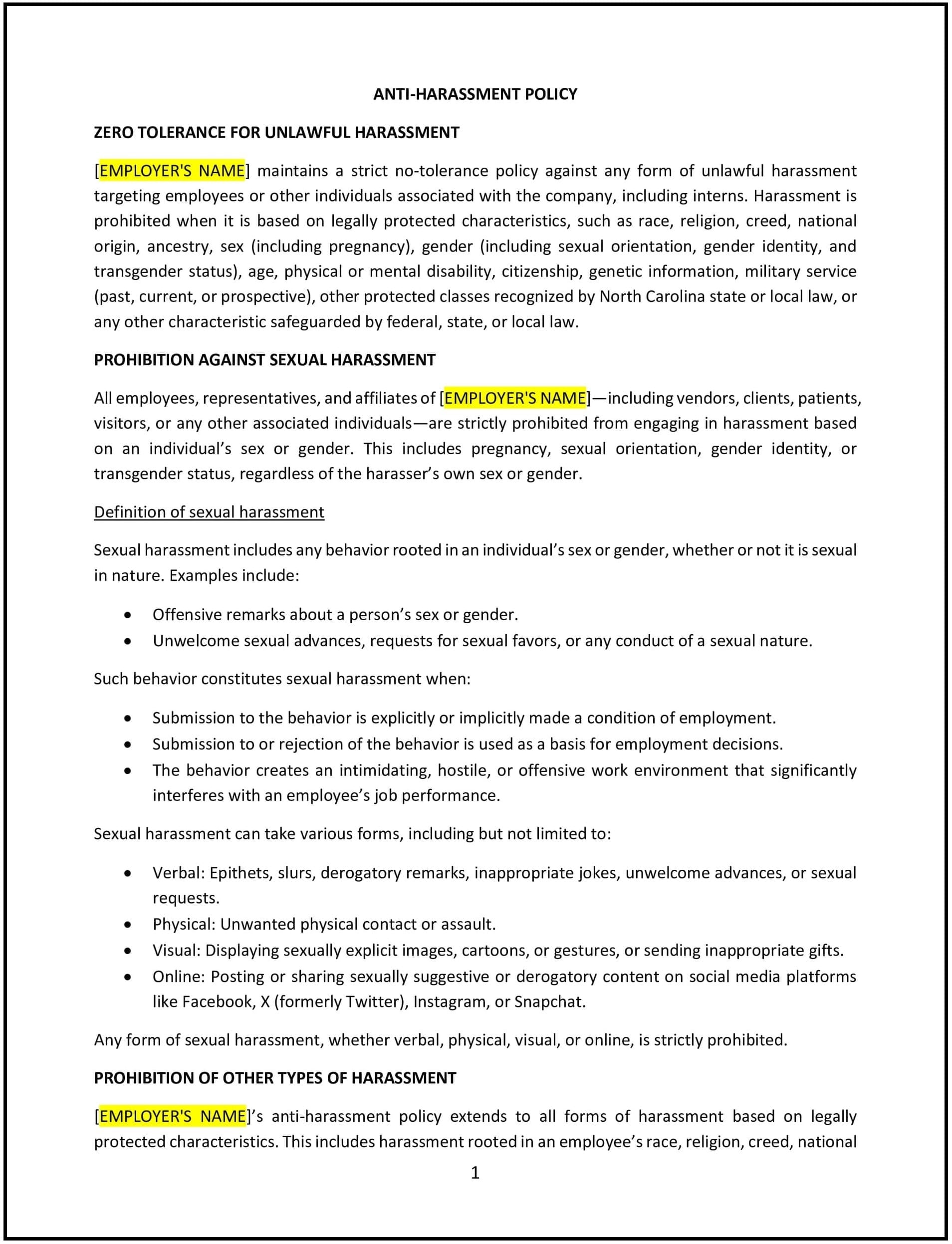Anti-harassment policy (North Carolina): Free template
Got contracts to review? While you're here for policies, let Cobrief make contract review effortless—start your free review now.

Customize this template for free
Anti-harassment policy (North Carolina)
An anti-harassment policy helps North Carolina businesses maintain a workplace free from harassment, discrimination, and bullying, ensuring a respectful and inclusive environment for all employees. The policy outlines the company's commitment to preventing harassment based on race, color, religion, sex, national origin, disability, age, or any other protected characteristic. It also provides clear steps for reporting harassment and the procedures for investigating and addressing complaints.
By adopting this policy, North Carolina businesses can create a safe and productive environment, minimize the risk of legal claims, and foster a culture of respect and inclusion.
How to use this anti-harassment policy (North Carolina)
- Define harassment: Clearly define what constitutes harassment, including verbal, physical, and visual conduct that creates a hostile, intimidating, or offensive work environment. This includes sexual harassment, bullying, and harassment based on protected characteristics such as race, gender, or disability.
- Set expectations for behavior: Outline the company's expectations regarding respectful conduct, including how employees should treat one another and what behaviors will not be tolerated in the workplace.
- Establish reporting procedures: Specify how employees can report harassment, including multiple reporting channels such as supervisors, HR, or anonymous hotlines. The process should ensure confidentiality and protection against retaliation for those who report harassment.
- Provide investigation procedures: Define how the business will investigate harassment complaints, including timelines, fairness, and steps to ensure a thorough and impartial process.
- Prohibit retaliation: Make it clear that retaliation against employees who report harassment or participate in investigations is prohibited and will result in disciplinary action.
- Reflect North Carolina-specific considerations: Incorporate any state-specific laws or regulations related to workplace harassment, including requirements for training, reporting, or investigations. Ensure the policy aligns with the North Carolina Equal Employment Practices Act and federal laws such as Title VII of the Civil Rights Act.
Benefits of using this anti-harassment policy (North Carolina)
This policy provides several benefits for North Carolina businesses:
- Fosters a respectful work environment: A clear anti-harassment policy creates a culture of respect, helping to prevent toxic behaviors that can harm employee morale, productivity, and overall workplace satisfaction.
- Mitigates legal risk: By proactively addressing harassment, businesses can reduce the risk of costly lawsuits and legal actions related to harassment claims.
- Enhances employee morale: Employees are more likely to feel valued and secure when they know the company has a clear, enforced anti-harassment policy in place.
- Promotes inclusivity: This policy encourages a diverse and inclusive work environment where all employees feel safe and respected, regardless of their background or identity.
- Supports business reputation: A commitment to maintaining a harassment-free workplace strengthens the business’s reputation as a fair and ethical employer, attracting top talent and building stronger relationships with clients and customers.
Tips for using this anti-harassment policy (North Carolina)
- Communicate the policy clearly: Ensure that all employees are aware of the anti-harassment policy and its provisions. This should be done through onboarding, employee handbooks, and regular training.
- Train employees and managers: Provide regular training for all employees, especially managers and supervisors, on recognizing, preventing, and reporting harassment. Training should also cover the company’s expectations for respectful conduct and how to handle complaints.
- Create a safe reporting environment: Ensure that employees feel comfortable reporting harassment by providing multiple reporting channels and emphasizing confidentiality. Make it clear that retaliation against those who report harassment will not be tolerated.
- Investigate complaints thoroughly: When a harassment complaint is made, ensure that it is taken seriously, investigated promptly, and handled in a fair and impartial manner. Follow up with the complainant to ensure they feel heard and supported.
- Review the policy regularly: The policy should be reviewed periodically to ensure it remains up-to-date with North Carolina’s laws, industry best practices, and the evolving needs of the workplace.